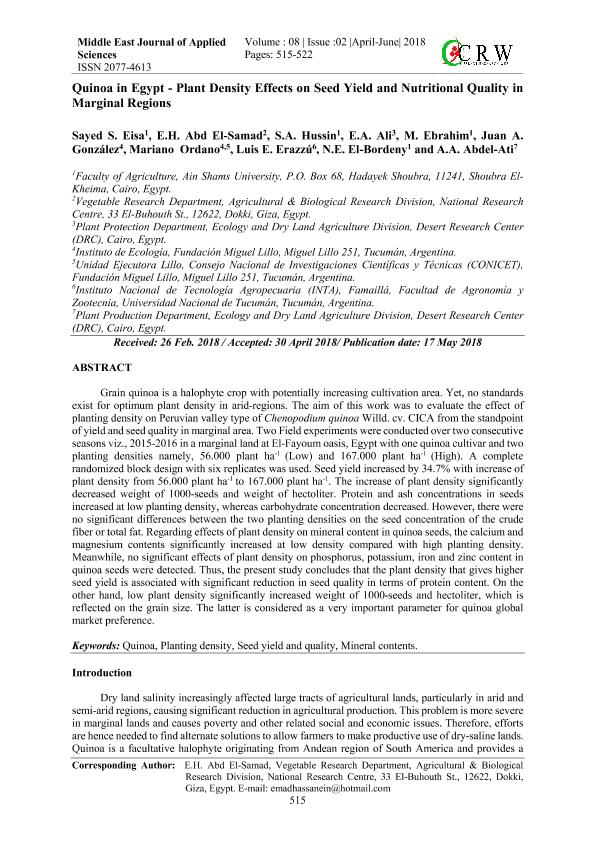Artículo
Quinoa in Egypt - plant density effects on seed yield and nutritional quality in marginal regions
Eisa, Sayed S.; Abd El Samad, Emad H.; Hussin, Sayed A.; Ali, Essam A.; Ebrahim, Mohamed; González, Juan Antonio; Ordano, Mariano Andrés ; Erazzú, Luis Ernesto; El Bordeny, Nasr E.; Abdel-Ati, Ahmed A.
; Erazzú, Luis Ernesto; El Bordeny, Nasr E.; Abdel-Ati, Ahmed A.
 ; Erazzú, Luis Ernesto; El Bordeny, Nasr E.; Abdel-Ati, Ahmed A.
; Erazzú, Luis Ernesto; El Bordeny, Nasr E.; Abdel-Ati, Ahmed A.
Fecha de publicación:
05/2018
Editorial:
National Research Centre
Revista:
Middle East Journal of Applied Sciences
ISSN:
2077-4613
Idioma:
Inglés
Tipo de recurso:
Artículo publicado
Clasificación temática:
Resumen
Grain quinoa is a halophyte crop with potentially increasing cultivation area. Yet, no standards exist for optimum plant density in arid-regions. The aim of this work was to evaluate the effect of planting density on Peruvian valley type of Chenopodium quinoa Willd. cv. CICA from the standpoint of yield and seed quality in marginal area. Two Field experiments were conducted over two consecutive seasons viz., 2015-2016 in a marginal land at El-Fayoum oasis, Egypt with one quinoa cultivar and two planting densities namely, 56.000 plant ha-1(Low) and 167.000 plant ha(High). A complete randomized block design with six replicates was used. Seed yield increased by 34.7% with increase of plant density from 56.000 plant ha-1 to 167.000 plant ha-1. The increase of plant density significantly decreased weight of 1000-seeds and weight of hectoliter. Protein and ash concentrations in seeds increased at low planting density, whereas carbohydrate concentration decreased. However, there were no significant differences between the two planting densities on the seed concentration of the crude fiber or total fat. Regarding effects of plant density on mineral content in quinoa seeds, the calcium and magnesium contents significantly increased at low density compared with high planting density. Meanwhile, no significant effects of plant density on phosphorus, potassium, iron and zinc content in quinoa seeds were detected. Thus, the present study concludes that the plant density that gives higher seed yield is associated with significant reduction in seed quality in terms of protein content. On the other hand, low plant density significantly increased weight of 1000-seeds and hectoliter, which is reflected on the grain size. The latter is considered as a very important parameter for quinoa global market preference.
Archivos asociados
Licencia
Identificadores
Colecciones
Articulos(UEL)
Articulos de UNIDAD EJECUTORA LILLO
Articulos de UNIDAD EJECUTORA LILLO
Citación
Eisa, Sayed S. ; Abd El Samad, Emad H. ; Hussin, Sayed A.; Ali, Essam A.; Ebrahim, Mohamed ; et al.; Quinoa in Egypt - plant density effects on seed yield and nutritional quality in marginal regions; National Research Centre; Middle East Journal of Applied Sciences; 8; 2; 5-2018; 515-522
Compartir



